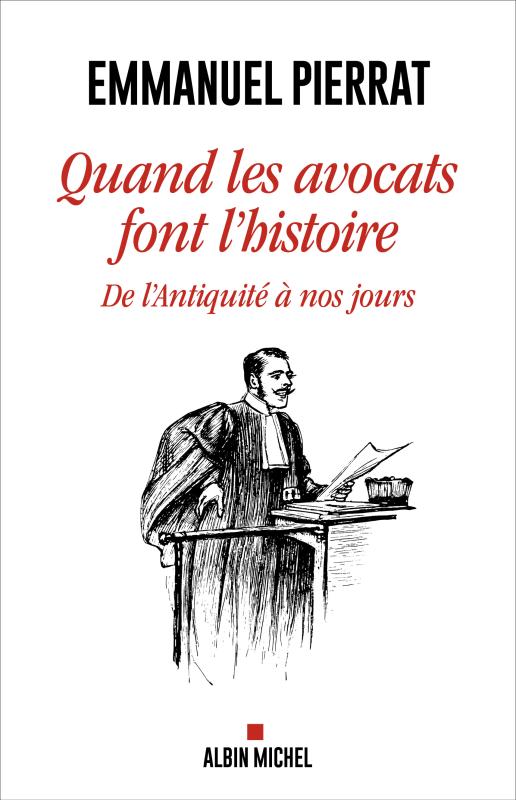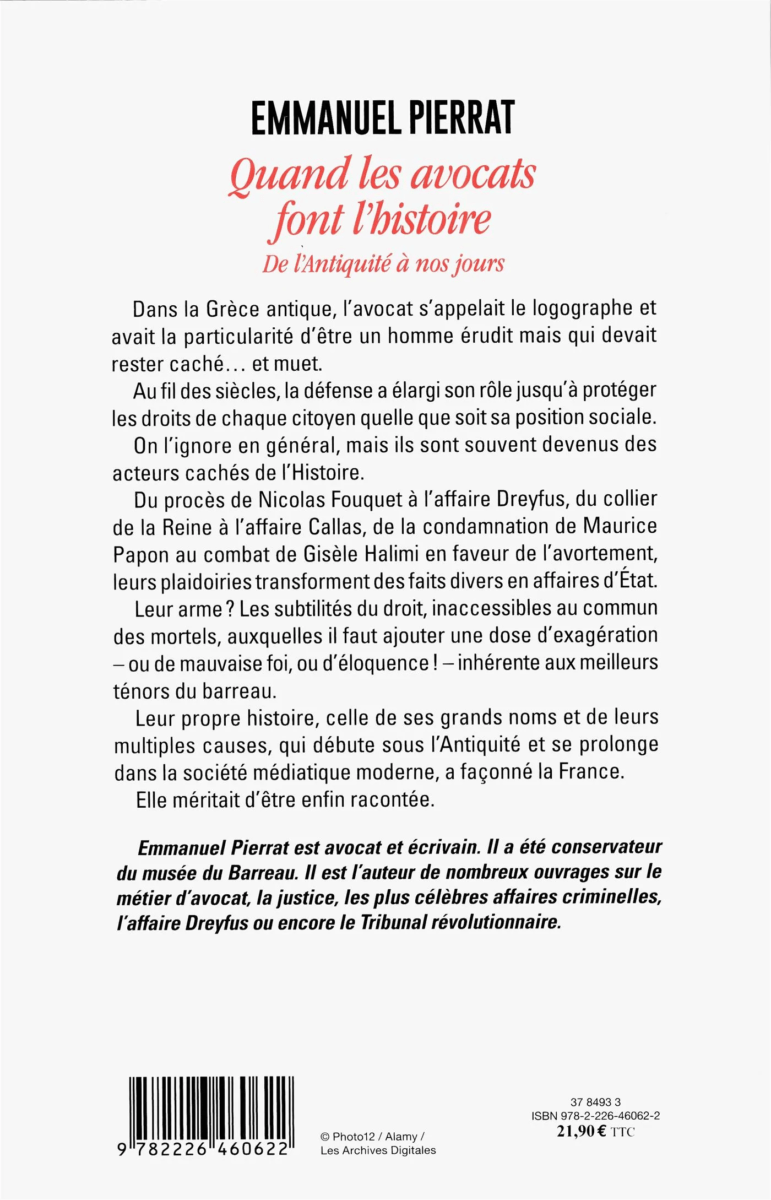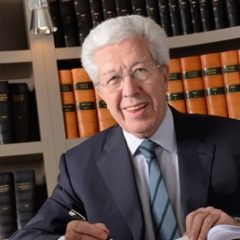“When lawyers make history from Antiquity to the present day”
Emmanuel Pierrat, member of the Paris Bar, prolific author, has published in fall 2022 an erudite book entitled “Quand les avocats font l’histoire de l’Antiquité à nos jours“ showing through the centuries the role, sometimes revolutionary sometimes reformist, of very talented lawyers, often embracing at the end a political career at the highest level.
In 336 pages published by Albin Michel, Emmanuel Pierrat showcases the most famous lawyers, their fevers, their harangues, and the societal and cultural changes that their voice has prompted in our “modern” societies.
This is the case of our founding partner, André Soulier, Dean of the Lyon Bar, to whom Emmanuel Pierrat devotes six pages (pages 269-275) of his book, under the significant title “When the lawyer precedes the law” which praises a legislative reform that followed one of the acquittals he has obtained in his career.


The six pages devoted to André Soulier are reproduced below.
When the lawyer precedes the law
Leading lawyers often have a Thousand and one lives[1], public necessarily, political – often, judicial of course, like André Soulier. As is the case for many of our colleagues who have been propelled into the spotlight. Following highly publicized trials, his name is notably associated with two famous cases: the most recent one is the trial of Cardinal Philippe Barbarin, accused of not having reported the sexual assaults of the priest Bernard Preynat on young scouts. The Archbishop of Lyon, initially given a six-month suspended prison sentence, was finally acquitted by the Court of Appeals in 2020.
But there was also, fifty years earlier, the story of Jean-Marie Deveaux[2] , a butcher assistant who was the victim of a miscarriage of justice in 1963 and sentenced to 20 years in prison for the murder of a child he did not commit.
André Soulier’s judicial struggle to defend Jean-Marie Deveaux prompted the adoption of the Law of July 17, 1970 on compensation for those who are victims of miscarriages of justice. “My role in this case was not to end with the release of Jean-Marie Deveaux” wrote André Soulier[3]. “I had already served three Ministers of justice under General de Gaulle […] I needed a fourth… It was René Pleven […]. Georges Pompidou was President of the Republic and Jacques Chaban-Damas was Prime Minister […]. As a young lawyer, I was shocked that innocent people who had been incarcerated for months, even years, were put back on the street without a cent following a dismissal, discharge or acquittal ruling. […] Jean-Marie Deveaux had spent eight years of his youth in prison. […] So I had to convince the Government to introduce a Law allowing compensation for anyone who had been incarcerated before benefiting from dismissal, discharge or acquittal ruling. […] René Pleven had Parliament pass a Law creating a Compensation Board sitting in Paris under the authority of President Monguillan, the future first president of the Cour de Cassation [French Supreme Court]. This is how I had the honor of filing the first request for compensation under the new Law.”
From humble origins and claiming it – “because nothing ever was a revenge[4] […] it’s not revenge that my father was not a multi-millionaire […]. He drove a coal truck, he was a small merchant, he had a hard time, he became a cab driver. He was a wonderful cab driver. De Niro was not better than him in Taxi Driver.”
André Soulier, a Freemason, member of the Union and Freedom Lodge of the Grand Orient, says that, despite the many political positions he has held, he has always been “first and foremost a lawyer”[5] . One does not prevent the other; he is nevertheless considered to be a man of networks and parties – close to Pierre Mendès France and François Mitterrand[6] and, in the Lyon region, to Francisque Collomb and Raymond Barre. According to the magazine Lyon Capitale[7], which made this astonishing calculation, he has seen 12 mayors of Lyon (“a position he will be close to exercising“), 8 popes (he worked for the Vatican and organized Jean-Michel Jarre’s concert during the visit of John Paul II) come and go, and 20 soccer World Cups (“he chaired the Ethics and Disciplinary Committee of the French National Soccer League” and pleaded for several soccer clubs: FC Metz, Paris-Saint-Germain, Olympique Lyonnais…).
Member of the European Parliament, Vice-president of the Rhone-Alps Regional Council, mayor of Villié-Morgon in the 1970s and deputy mayor of Lyon, not to mention his various advisory positions, Soulier has “fully lived” his multiple lives without neglecting any. For example, he was at the side of Joannès Ambre[8] in the defense of the famous “Lyonnais gang”: “I owe a lot to Joannès Ambre, who turned me away from the Évreux bar, where Pierre Mendès France wanted me, to the Lyon bar and invited me to join his firm as an associate[9]”, he explains. But, ironically, when in 1975 Christophe Mérieux, son of Alain Mérieux (president of the BioMérieux pharmaceutical institute), was kidnapped at the age of 9, and a ransom of 20 million francs was demanded – at the time the highest ransom ever demanded – André Soulier was the lawyer of the Mérieux family.
While Louis Guillaud[10] , known as “Loulou la Carpe”, a member of the Lyonnais gang, was sentenced to 20 years in prison in 1981, the mystery surrounding this kidnapping has not been solved, especially concerning the accomplices. Because “la Carpe” will remain definitively mute following the suicide of “Loulou” in 2008. At the time of the lawsuit related to the industrial disaster of the refinery of Feyzin (Rhone), which entailed in 1966 the death of 18 people and left 80 people injured, he represents the civil parties.
In 1970, in the case concerning the fire at the “5-7” nightclub in Saint-Laurent-du-Pont, Isère, where 146 people died, he defended the interests of 52 civil parties. Soccer being an important part of his “love for sport”, André Soulier has been inter alia Michel Platini’s lawyer in the case concerning the slush fund of the AS Saint-Étienne soccer club[11], which created a shock wave in 1982, as considerable sums of money had been illegally paid into said fund in order to “retain” the best players of the club: Michel Platini, Patrick Battiston, Jacques Zimako, Bernard Lacombe and Christian Lopez[12] . In the 1992 Furiani tragedy, already mentioned in the pages devoted to Paul Lombard, lawyer for victims, Soulier defended the president of the French Soccer Federation. And in the case concerning the A320 plane crash at Mont Sainte-Odile, where 87 passengers lost their lives, he represented the families of the victims to obtain decent compensation.
André Soulier can also pride himself on having been, during the 1980s, an advisor to Lech Walesa on matters relating to the publication of his works. He tells[13] how, during his trip to Gdańsk in 1988, he slept “in the bed occupied the year before by an already famous Beaujolais friend, Bernard Pivot, who came to interview Lech Walesa for his special TV show “Apostrophes” following the release of his book[14] in France.“
André Soulier, in his perception and presentation of the “solitary exercise” of the defense of the accused, confirms its indispensable temporality: “Defending [the accused] is not taking refuge in moral comfort and ease, and it is not equally to become the accomplice of a murderer. Will it be said that the priest who gives absolution thus erases the fault? Will we accept that the wounded murderer does not receive the assistance of a doctor? The black robe we wear is not only a symbol: it represents the pathos of existence with its sorrows and misfortunes […]. The penitent cannot remain alone. Faced with a silent or vociferous society, he must be accompanied by a man alone: his lawyer.[15]”
[1] André Soulier, Mes mille et une vies, foreword by Robert Badinter, Le Cherche Midi, 2021.
[2] In July 1961, a 7-year-old girl, Dominique Bessard, is found dead, with several stab wounds and her throat slit, in the basement of a low-income building in the suburbs of Lyon. Her father runs a butcher shop on the ground floor of the building, and the little girl was seen in front of the store before she disappeared. Jean-Marie Deveaux, 19 years old, is an apprentice there. The police focuses on him but first rules him out as a suspect. It was then that Deveaux, who thinks he is the victim of a rumor that he is the murderer, tries to suggest that he had been attacked in the very place where the girl was found dead.
This story turns against him: if he lied here, he is probably also lying for the murder of Dominique Bessard.
Out of panic fear of shots, he refuses to consent to the truth serum test and confesses. And to make matters worse, he changes his mind several times.
During the reconstruction of the crime scene, the investigators suggest answers to him, but they pay no attention to another avenue of investigations concerning the presence of a prowler, even though many witnesses have reported it, with the result that another murder is later committed in the same way, while Deveaux was in custody. Procedural flaws, bungled investigations… the verdict is delivered: 20 years’ imprisonment. Two men fought tooth and nail to denounce this flagrant miscarriage of justice: Father Boyer, a Jesuit prison visitor, and André Soulier, who never ceased to contest the way the trial was held and to demand a retrial, which he obtained after years of struggle. In September 1969, Jean-Marie Deveaux was eventually acquitted (the actual murderer has not yet been identified to this day).
For the 8 years he wrongly spent behind bars, he received, in 1972, 125,000 francs as compensation, which he used in part to offer a car to Father Boyer.
[3] A. Soulier, Mes mille et une vies, op. cit.
[4] Le Miroir de Lyon, February 4, 2021.
[5] In an interview for the magazine Lyon Capitale on February 1, 2021, he declared: “What has invaded my life is the bar, the fight against injustice, the fact of being alone with someone who is perhaps going to die even though he has committed a crime or has been dragged into improbable adventures or was quite simply innocent. I am first and foremost a lawyer. I have sat in many assemblies but in the end, it was always the defense lawyer who stood up, not the politician.”
[6] “I was the protégé of Pierre Mendès France. I have been the companion of François Mitterrand for twenty years. I left four years before he became President of the Republic” said Soulier in an interview with the Miroir de Lyon on February 4, 2021.
[7] February 1, 2021.
[8] For Joannès Ambre and the case of the “Lyonnais gang”, see chapter 7 and note No. 1 p. 217. 217.
[9] Lyon People, March 25, 2021.
[10] In his book Mes mille et une vies, André Soulier recounts that at the time of the Guillaud trial, he and his wife received death threats that led to the arrest of an individual defended by Joannès Ambre, who expressed his surprise in front of the TV cameras about the “unjustified accusations against his client”. “This made my blood boil, remembers Soulier. I went to his office and made him read a few lines where I regretted that the word of a thug weighs more heavily than those of my wife and myself. He apologized […]. I was saddened by this incident for a long time.”
[11] The President of the club, Roger Rocher, was sentenced to 3 years’ imprisonment (32 months suspended) and a fine of 800,000 francs. He was granted a presidential pardon by François Mitterrand in 1991.
[12] They were sentenced to a 4-month suspended prison term and variable fines (300,000 francs for Platini).
[13] In his book Mes mille et une vies, op. cit.
[14] Lech Walesa, A Path of Hope, Fayard, 1987.
[15] A. Soulier, Mes mille et une vies, op. cit.
 Strategic Lawyering
Strategic Lawyering 